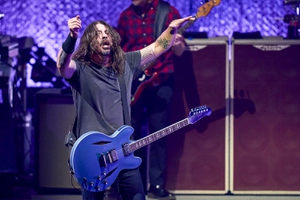Father’s day weekend is upon us. And, a new album came out this week.
A man stands there, on an album cover, literally, a man with his hat in his hand. His famous name is on the cover of the disc, too, and the producer, Rick Rubin, is a legend at helping artists reconnect with their muse. Open the packaging and the disc has the famous label, Columbia, there, too, even with the dissolution of the recording industry: Columbia Records. It is all a fan could hope for, almost. Except this isn’t the man. This is the son.
To this day on his Never Ending Tour, the man’s father opens his concerts with a taped voice saying: “Ladies and Gentleman please welcome, Columbia Recording artist Bob Dylan.”
But musically speaking this Columbia recording artist is best known for his couple minor hits in the Wallflowers. At the end of the day though he is known as the colossus that is his father: the greatest songwriter to ever live, the only songwriter ever to be nominated for the Nobel Prize for Literature. You pick your standard for greatness from awards (Dylan picked up his special Pulitzer this year to add to his Oscar and many Grammy Awards), admiration by fellow artists (Dylan is certainly the single most covered individual songwriter in the recording era), and variety (Dylan’s heart is in folk-blues, but his many side trips have gone so far as to include some of the greatest gospel songs of the last century).
Even Dylan scholarship is in a different league than what is written about any other popular music act (even the far more commercially prominent Beatles). If you have any doubt about the seriousness with which the academy takes Dylan, examine Oxford Professor of Poetry Christopher Ricks’ recent obsessive study of Dylan’s songwriting in “Dylan’s Visions of Sin.”
Ricks is no rock fan, but there comes a rare point where an artist’s ascent so towers above his peers that there simply is no precedent or comparison. Picasso was such an artist, and so is Bob Dylan. We will not see his kind again.
So, where does that leave the son, hat in hand, with the blessed genes and insurmountable legacy?
I always feel badly for Jakob Dylan, the one child of the master to go into songwriting. How do you stand in that all consuming shadow? Jakob Dylan’s new Seeing Things is a good disc, a very good disc, in the confessional songwriter style his dad more-or-less invented on Blood on the Tracks during one of his many incarnations of the ‘70s.
Blood on the Tracks painfully details the break-up of Jakob’s parents and the traumas of his own childhood. Real Bob Dylan fans (and probably Jakob) also have heard Blood on the Tapes; widely bootlegged, Tapes offers the original even angrier and more explicit versions of those songs of divorce and family dissolution.
And, it isn’t just Bob Dylan’s talent and subject matter that stand between his son and any audience. Jakob Dylan’s own songs are endlessly examined by Bob Dylan fanatics (of which I am one) for any hint of insight into his relationship with his father. It is none of my business; yet I can’t help myself. There can’t be another songwriter alive who is as hard to judge as Jakob Dylan.
As a thought experiment, say, if as performance art, his dad had recorded and presented the songs on Seeing Things, as the new Bob Dylan disc. There would be acclaim worshipful reviews, more sales and some lines like “my age is a metaphor that only speaks of everything before” getting nods from experts as having the fingerprints of the master’s unmistakable writing. But Jakob Dylan wrote that line and the other words on Seeing Things working with light instrumentation of guitar and bass.
As a result, the fate of Seeing Things will be reviews as quiet and respectful as the backing music on the disc. I do not know where that leaves Jakob Dylan beyond needing to read a biography of Johann Christoph Friedrich Bach for perspective. But songs on Seeing Things seem to suggest Dylan, the younger, has found perspective, and doesn’t need my sympathy. On “Valley of the Low Sun” Dylan sings: “My dreams are humble lean as arrows/Streetwise ready and fair/As we bum rush the ages tied to the rails.” Is the reference to Blood on the Tracks? My heart quickens. And, so it goes, with young Dylan literally and always “tied to the rails” of his father’s battleship reputation. Yet, with “humble dreams” is that so bad? “I want to be Bob Dylan,” the Counting Crows once sang. But maybe Jakob Dylan does not. We can’t all be the Voice of a Generation and even Bob Dylan hated that job.
Jakob Dylan has remained dogged at his chosen career of writing songs and making records. And, maybe there is a reason that in the end matters more than the courage it takes, year after year, to get up on stage with both being the son of Bob Dylan and a guitar hanging around his neck. “I been working double shift all night/My line of work suit me fine.” Dylan sings on “All day and All night.” No one would confuse those words with lines by his dad. But, in part, that is because there is a certain satisfaction and even happiness in the song and those are feelings that restless, enigmatic and generally melancholy Bob Dylan has never been able dwell on. Perhaps, also, the song suggests, that at the end of the day, Jakob Dylan likes what he does and is able to do it well and that is sufficient. Yeah, he has special burdens, as he sings on the same song: “Got Bigger Secrets Than You Do.” And, undoubtedly that is true as he well knows; he will always be parsed through his dad.
But just maybe, Seeing Things hints, Jakob Dylan has learned the key to happiness is to be making music with skill and passion in a world where not everyone gets to be Bob Dylan.







Previous Discussion: